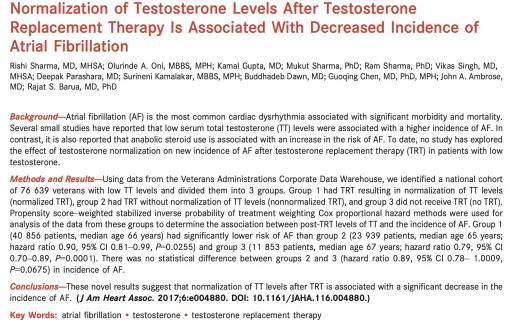From Ramasamy' study:
View attachment 33684
We demonstrated that developing secondary polycythemia while receiving TT, defined as a hematocrit over 52%, was associated with increased risk of developing MACE and VTE during the first year of therapy. TT itself, in the absence of polycythemia, did not appear to increase risk of MACE/VTE in hypogonadal men. To our knowledge, this is the first study to establish secondary polycythemia from TT as an independent risk factor for MACE/VTE using a specific hematocrit-based cutoff.
We used a large national database to answer this question, hypothesizing that real-world data would be best suited to address this issue. Men with high baseline hematocrit are often excluded from randomized trials, and in clinical practice pre-treatment blood work is often not done, and guidelines are frequently not followed.
20,21 This leaves a large population of men using TT who are not represented by RCTs. Our findings are somewhat supported by prior literature.
The TOM (Testosterone in Older Men with Sarcopenia
) trial, an RCT that was stopped early due to increased risk of cardiovascular adverse events, included older men with a high incidence of comorbid conditions.
22 While this trial only included 209 men, their demographic information is similar in nature to our study, which included a large proportion of men with comorbid conditions. Like most RCTs on testosterone, the TOM trial did not report hematocrit values in those men with cardiovascular events. One systematic review on this topic did not find overall increased cardiovascular risk, however they did find an increased event rate in the first 12 months of therapy, supporting our window of 1 year for evaluation of MACE/VTE.
23
Another review reinforced the value of using large databases in answering this question, highlighting that all published RCTs on this topic are underpowered to assess any association with treatment and cardiovascular outcomes.
24
This will hopefully be addressed by the TRAVERSE (Testosterone Replacement Therapy for Assessment of Long-term Vascular Events and Efficacy ResponSE in Hypogonadal Men) trial (NCT03518034), however polycythemia or hematocrit-based adverse events are not listed as an outcome.It is well established that TT increases the risk of secondary polycythemia,
25 with higher rates in longer-acting modalities and lower rates in shorter-acting modalities.
16 Multiple national guidelines use elevation in hematocrit as a trigger to stop or change TT in men.
TT cessation triggers include 55% from Canadian guidelines,9 54% from endocrine society guidelines and European urology guidelines,5,26 and between 50%–54% from American urological guidelines.10 While the rationale for these cutoffs is not cited in these guidelines, they appear to come from the Framingham heart study, which found an increase in adverse cardiovascular outcomes with a hematocrit of 49% or higher.
8 These findings were confirmed in a more recent prospective cohort study, which found an increased rate of overall and cardiovascular-related mortality once hematocrit entered the range of 50%–54%.
27 Neither of these studies specifically studied men on testosterone, and thus the currently existing hematocrit cutoffs amongst TT users is arbitrary. For the purposes of our study, we chose a cutoff of 52%, reflecting other published literature, and to ensure a relatively large comparator arm.
10,16
The strengths of this study include its use of a large multi-institutional database and being a real-world snapshot of the effects of TT in a U.S. cohort. There is increasing evidence that nonrandomized evidence from large databases can accurately emulate a large-scale RCT, lending validity to these results.
28 Detailed propensity-score matching increased the validity of our findings. Lastly, our sensitivity analyses, and analysis of TT-naïve men, support the role of polycythemia as an independent, critical factor in the development of MACE/VTE.
Limitations include the inability to segregate results by type of testosterone prescription. In addition, a large percentage of the men included are Caucasian (86%), and the matched populations have a relatively high comorbidity index, limiting the generalizability of the findings to minorities and healthy individuals. Furthermore, we were not able to match the 2 groups by baseline hematocrit, as the men in the polycythemia group had a higher baseline hematocrit.
Therefore, we cannot definitively determine whether the increased risk of MACE/VTE is due to hematocrit reaching 52% or due to men with higher baseline hematocrit starting TT. Regardless, the baseline hematocrit in the polycythemia group was 47.4%, which according to U.S., Canadian and European guidelines does not warrant further investigation before starting TT.
Lastly, due to the limitations of the TriNetX database, we were unable to analyze hematocrit as a continuous variable.Regardless of these limitations, this study lends prescribers a practical approach to informing about risks of TT, and reinforces existing guideline practices of checking hematocrit prior to prescribing.
5 It also provides a hematocrit-based cutoff that comes directly from a population of men using TT, and can hopefully allow future guideline statements to remain consistent across recommendations. Future studies that aim to assess cardiovascular outcomes in men on testosterone (such as the ongoing TRAVERSE study, NCT03518034) should perform detailed analysis on hematocrit change to investigate this as a possible association.
CONCLUSION
Men using TT should be aware that they are at a higher risk for MACE/VTE if their hematocrit reaches or exceeds 52% during the first year of therapy. This is especially relevant in men with cardiovascular comorbidities. Hematocrit-based cutoffs should be incorporated into the outcomes of future RCTs investigating MACE/VTE and TT




















